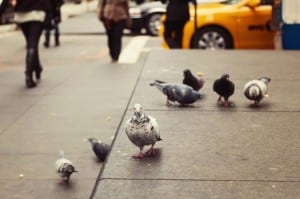
by Pigeon Patrol | Apr 19, 2016 | Bird Netting, Pigeon Patrol's Services, Pigeon Spikes
 THE new experiment to control the pigeon population in Singapore should be conducted with care, to make sure that only the targeted species – pigeons – are affected, and not other bird species and stray animals.
THE new experiment to control the pigeon population in Singapore should be conducted with care, to make sure that only the targeted species – pigeons – are affected, and not other bird species and stray animals.
That was the response from two civil groups we spoke to when we asked them about Agri-Food and Veterinary Authority of Singapore’s (AVA) newest pilot – to control the pigeon population in Singapore by feeding them a a corn-based feed containing a drug, nicarbazin, which either stops the female pigeons from producing eggs or causes them to lay eggs that don’t hatch.
Both civil groups – Society For The Prevention Of Cruelty To Animals (SPCA) and the Nature Society Singapore (NSS) – called the trial a good move, but added that it should be conducted with care.
The trial, which started on Oct 13, is currently being limited to a field outside the Masjid Haji Muhammad Salleh mosque in Palmer Road, near Shenton Way. The number of pigeons outside the mosque has doubled over the last two years – there are now over 400 pigeons. It would take about a year to see a drop in the pigeon population, and if the trial is successful, the method will be tried out in other parts of Singapore.
When tested in Italy, the method was found to reduce the pigeon population in the test area by 30 per cent to 40 per cent over four years.
In the past year alone, there have been 3,400 pigeon-related complaints – 36 per cent more than the 2,500 complaints that AVA has received in 2014. Most of the complaints are about hygiene, environmental issues resulting from their droppings, and concerns over diseases and people feeding them.
A larger picture shows that feedback on all birds have also been on the rise – there were 6,100 bird-related complaints this year. This is a 38.6 per cent increase from the 4,400 bird-related complaints submitted to AVA in 2013.
Ms Corinne Fong, executive director of SPCA, said that SPCA has always advocated sterilisation for stray cats and dogs. “If AVA is embarking on this with birds – controlling the population by sterilising them and not culling them, that would be fantastic,” she said.
She also added that SPCA has had various complaints about the pigeon population in Singapore, but since it doesn’t have the capacity to deal with birds, the complaints are generally referred to NEA. However, she added that those carrying out the trial would have to be careful of other stray animals.
“The contractors for AVA would have to be mindful that there are community cats and dogs, and children for that matter,” she said. “They must be observant of other stray animals – if any – that are going around picking the food.”
The pigeon feed will not harm other animals or humans if consumed accidentally in small doses. However, if consumed in large doses, it can be toxic – it would take 40kg of the feed to see toxic effects in dogs and cats, and 60kg for a child.
Mr Wing Chong, chairman of the Bird Group – which is a special interest group of the Nature Society (Singapore), said that the execution of the trial would have to be well controlled.
“The location and the manner of the pigeon feed should be carefully selected, so that only the targeted bird species should be affected,” he said. For example, a trained personnel should be present when the pigeons are being fed, and they should be careful that no excess drugged feed should be left behind. “The feed should also not be administered near water, or under rain, to prevent uncontrolled spread of the drug,” he added.
Currently, five mosque volunteers will be in charge of feeding the drugged feed to the pigeons. The question is: Should we have more trained personnel handling the feeding, since it might have adverse effects on other birds if ingested?
About Pigeon Patrol:
Pigeon Patrol Products & Services is the leading manufacturer and distributor of bird deterrent (control) products in Canada. Pigeon Patrol products have solved pest bird problems in industrial, commercial, and residential settings since 2000, by using safe and humane bird deterrents with only bird and animal friendly solutions. At Pigeon Patrol, we manufacture and offer a variety of bird deterrents, ranging from Ultra-flex Bird Spikes with UV protection, Bird Netting, 4-S Gel and the best Ultrasonic and audible sound devices on the market today.
Voted Best Canadian wholesaler for Bird Deterrent products four years in a row.
Contact Info: 1- 877– 4– NO-BIRD (www.pigeonpatrol.ca)
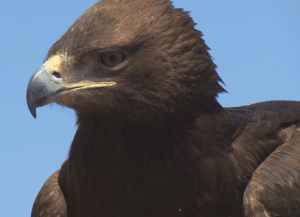
by Pigeon Patrol | Apr 18, 2016 | Animal Deterrent Products, Bird Netting, UltraSonic Bird Control
 The University of Canterbury (UC) hopes a native falcon will eradicate hundreds of pigeons plaguing the campus.
The University of Canterbury (UC) hopes a native falcon will eradicate hundreds of pigeons plaguing the campus.
In its latest move to reduce the pigeon population, a karearea bird – as pictured on the $20 banknote – has been trained to make territorial flights to scare off flocks of pest birds from buildings and the campus.
Marlborough Falcon Trust handlers Vikki Smith and Rob Lawry have been free-flying the specially bred one-year-old karearea, called Tappe, in what is believed to be the first programme of its kind in New Zealand.
Marlborough Falcon Trust handler Rob Lawry hopes Tappe, a karearea bird, will stop University of Canterbury’s pigeon problem.
DEAN KOZANIC
Marlborough Falcon Trust handler Rob Lawry hopes Tappe, a karearea bird, will stop University of Canterbury’s pigeon problem.
UC engineering services manager Rob Oudshoorn said the pigeon problem had “escalated dramatically” since the quakes when central city roosting spots were pulled down.
Combined with an abundance of food from the ruined city and the campus’ proximity to town, the university’s pigeon population has ballooned into the hundreds and affects more than 20 buildings.
The falcon is the university’s latest innovation to solve the problem after unsuccessful attempts using electric fencing, spikes and controlled culling with slug guns, Oudshoorn said.
Excrement is the biggest problem the birds bring as it piles around doors, windows, footpaths, and roofs, he said. Where pigeon numbers are high, buildings deteriorate more rapidly and the spread of disease increases.
“And depending on the scale of it, it can become quite an issue. In the extreme if it’s left there for a long period of time, those piles of excrement bring in maggots, and the excrement itself is pretty toxic too really.”
With a population of around 6000, karearea are rare. They are a natural predator to pigeons, which use avoidance and escape as a natural defence.
The natural bird control technique is used around the world, including Dubai, airports and London’s Trafalgar Square.
Lawry said the birds are trained to fly to a lure held by an instructor, rather than to capture birds.
“As the falcon comes rocketing towards the lure I pass it behind me in the direction I want it to travel, and so he goes up high in that direction. When he goes high the pigeons will go ‘I’m out of here because there’s a falcon here’. But at that point if there’s a really slow pigeon the falcon might get it.”
About Pigeon Patrol:
Pigeon Patrol Products & Services is the leading manufacturer and distributor of bird deterrent (control) products in Canada. Pigeon Patrol products have solved pest bird problems in industrial, commercial, and residential settings since 2000, by using safe and humane bird deterrents with only bird and animal friendly solutions. At Pigeon Patrol, we manufacture and offer a variety of bird deterrents, ranging from Ultra-flex Bird Spikes with UV protection, Bird Netting, 4-S Gel and the best Ultrasonic and audible sound devices on the market today.
Voted Best Canadian wholesaler for Bird Deterrent products four years in a row.
Contact Info: 1- 877– 4– NO-BIRD (www.pigeonpatrol.ca)
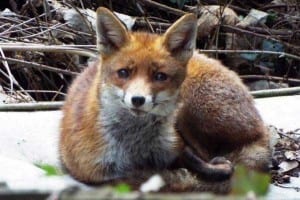
by Pigeon Patrol | Apr 17, 2016 | 4-S Gel Bird repellent, Bird Netting, Pigeon Patrol's Services, Pigeon Spikes

A fox trying to get some sleep on an abandoned mattress in a disused Bournemouth garden. Must credit Blue Planet Society @Seasaver
LITTER blamed on young people is in fact often caused by foxes and pigeons, a Bournemouth councillor has claimed.
Cllr Michael Weinhonig made the assertion after asking the Environment and Transport Overview Scrutiny Panel what could be done to “deter the influx” of the urban animals.
The Strouden Park ward councillor, who said he was raising the subject after conversations with residents, asked if an article could be included on the subject in the council’s magazine, BH Life.
“We should perhaps educate residents not to feed them and also encourage other environmental measures for the natural environment of hedgehogs and other wildlife,” said Cllr Weinhonig.
Cllr David Smith, cabinet member for environment, responded that foxes “cannot really be controlled”, explaining that their territorial nature means when they are killed others from neighbouring areas always take their place.
He added that the problem of pigeons “has been going on for some years in this town”.
Cllr Smith cited the decline of pigeons in London’s Trafalgar Square as an example of how “robust” measures can help reduce numbers.
Cllr Weinhonig, however, said he would like the matter to be “taken more seriously”.
“If you were to starve [the foxes] out they are not going to come back to that territory,” he said.
“Take the litter element for example – there are bins where pigeons and foxes are diving in and creating litter – which is often attributed to young people and I think there can be something done.”
Cllr Smith told Cllr Weinhonig he did take the matter seriously and would liaise with the authority’s pest control officer to look for a solution.
After the meeting, Cllr Weinhonig told the Daily Echo he was not calling for a cull of foxes and pigeons. He said he was calling for more education, in particular to encourage residents not to feed the animals.
Share article
There are only two legal methods to dispose of foxes – shooting and cage trapping in combination with a lethal injection.
Hackney council in London was recently forced to scrap an urban fox cull – which would have been the first in 30 years – after pressure from animal rights activists.
About Pigeon Patrol:
Pigeon Patrol Products & Services is the leading manufacturer and distributor of bird deterrent (control) products in Canada. Pigeon Patrol products have solved pest bird problems in industrial, commercial, and residential settings since 2000, by using safe and humane bird deterrents with only bird and animal friendly solutions. At Pigeon Patrol, we manufacture and offer a variety of bird deterrents, ranging from Ultra-flex Bird Spikes with UV protection, Bird Netting, 4-S Gel and the best Ultrasonic and audible sound devices on the market today.
Voted Best Canadian wholesaler for Bird Deterrent products four years in a row.
Contact Info: 1- 877– 4– NO-BIRD (www.pigeonpatrol.ca)
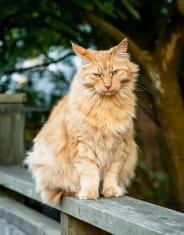
by Pigeon Patrol | Apr 16, 2016 | 4-S Gel Bird repellent, Animal Deterrent Products, Bird Netting, Pigeon Patrol's Services
 Owning a cat is known to have positive health effects, such as reducing stress and improving mood. But it can have downsides, too.
Owning a cat is known to have positive health effects, such as reducing stress and improving mood. But it can have downsides, too.
Allergy UK estimates that half of all asthmatic children are allergic to cats, for example.
Now scientists are looking at whether Britain’s ten million cats are putting their owners at risk of another condition: anxiety.
The focus of their investigation is Toxoplasma gondii, a tiny, single-cell parasite commonly found in cat droppings, which causes the disease toxoplasmosis.
Pregnant women have long been advised to avoid emptying cat litter trays, as ingesting the parasite accidentally from unwashed hands in early pregnancy can cause miscarriage or stillbirth. In adults, more rarely it can also lead to blindness by causing scarring at the back of the eye. Other sources of infection include undercooked meat and unwashed fruit and vegetables.
Now scientists think exposure to Toxoplasma gondii could be to blame for many cases of anxiety.
It’s a theory backed by some of Britain’s leading experts on parasitic diseases.
In a study at the University of Michigan, blood samples from 450 adults were checked for antibodies to Toxoplasma gondii.
The presence of these antibodies is a sign the person has been infected. Researchers then identified the study participants who had been diagnosed with generalised anxiety disorder, or GAD.
Anxiety is a normal but temporary response to stress or danger. But with GAD, the anxiety is excessive – a constant worrying when there is no danger present. Up to 7 per cent of the population – nearly five million people in Britain – are thought to be affected with symptoms, ranging from a racing heartbeat and shortness of breath to agitation and constant dread. The University of Michigan research, published in the journal Brain, Behaviour and Immunity, found that people with antibodies to the parasite were twice as likely to have been diagnosed with GAD.
And those with the highest levels of antibodies, suggesting greater exposure to the parasite, were three times more likely to be affected by GAD. It’s thought that while antibodies might destroy some parasites, others evade detection and head for the brain.
The researchers said: ‘Our study is the first to examine the association between T. Gondii infection and diagnosed anxiety disorder.’
This is not the first time the parasite has been linked to brain-related problems. Previous research has linked infection with this parasite to an increased risk of schizophrenia and learning disabilities in children.
‘There are even some fascinating studies showing Toxoplasma can cause decreased reaction times and a greater chance of being involved in road accidents,’ says Professor Joanne Webster, from the Centre for Emerging, Endemic and Exotic Diseases at the Royal Veterinary College in London, whose research in the Nineties led to an extraordinary discovery about the effect Toxoplasma had on rats’ behaviour.
The parasite exits the body via droppings – and, if these are then eaten by a rat, the parasite heads straight for the brain, where it somehow switches off the innate fear the rodent has of cats, and makes it crave the smell of feline urine.
All the rat’s survival instincts disappear and it effectively serves itself up as dinner for a cat. ‘It’s basically manipulating the rat’s mind,’ says Professor Webster.
It’s this same ‘manipulation’ which scientists think might trigger anxiety in humans.
To be on the safe side, wear gloves when cleaning a litter tray
Studies suggest Toxoplasma produces its own supply of dopamine, a brain chemical that sends signals between cells.
The parasite’s dopamine might disrupt the normal chemical balance in the human brain.
Although too little dopamine has been linked with anxiety, so has too much, and research suggests that the parasite can trigger over-activity in the amygdala, the area of the brain that is involved in expressing anxiety.
But should cat owners be worried? There are only 350 confirmed human cases of toxoplasmosis in England and Wales a year.
But according to NHS Choices, up to a third of us will be infected at some point, yet not even notice any symptoms (typically it causes flu-like symptoms that last for a couple of weeks).
Maggie Roberts, director of veterinary services at Cats Protection, says: ‘I have lots of friends who are vets and have handled hundreds of cats and were tested during pregnancy for Toxoplasma – and I don’t know one who has tested positive.’
She says cats are infectious for only about ten days in their whole life. Afterwards, they are resistant. ‘To be on the safe side, wear gloves when cleaning a litter tray and wash your hands thoroughly afterwards.’
About Pigeon Patrol:
Pigeon Patrol Products & Services is the leading manufacturer and distributor of bird deterrent (control) products in Canada. Pigeon Patrol products have solved pest bird problems in industrial, commercial, and residential settings since 2000, by using safe and humane bird deterrents with only bird and animal friendly solutions. At Pigeon Patrol, we manufacture and offer a variety of bird deterrents, ranging from Ultra-flex Bird Spikes with UV protection, Bird Netting, 4-S Gel and the best Ultrasonic and audible sound devices on the market today.
Voted Best Canadian wholesaler for Bird Deterrent products four years in a row.
Contact Info: 1- 877– 4– NO-BIRD (www.pigeonpatrol.ca)
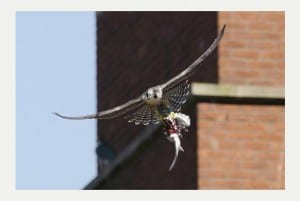
by Pigeon Patrol | Apr 15, 2016 | 4-S Gel Bird repellent, Bird Netting, Pigeons in the News, UltraSonic Bird Control
 Birds of prey are being drafted in to Northamptonshire, to help deal with problem pigeons posing a health risk in Daventry town centre.
Birds of prey are being drafted in to Northamptonshire, to help deal with problem pigeons posing a health risk in Daventry town centre.
The action is being taken by Daventry District Council, in response to concerns over the growing number of pigeons creating a mess in the town, particularly Bowen Square and Foundry Place.
As well as looking unsightly, bird droppings carry disease and can erode stonework on buildings and block gutters.
During a two-week programme, experienced handlers will fly falcons in a wide arc around the town centre, deterring pigeons from roof tops and balconies. The Harris hawk will be walked around the town to move the pigeons from paths and walkways.
The birds of prey will then be brought back to the town, to deter the pigeons from returning.
“Our falconry response programmes create a visual deterrent, letting the pest birds know that the area is no longer safe.The presence of a hawk or falcon quickly makes an area undesirable to feral pigeons and encourages them to establish a new pattern of behaviour. This is a natural method of bird control which utilises nature’s instincts to move the pigeons on – they will not roost in an area where they know there is a predator and over time pigeons will leave the area.”
About Pigeon Patrol:
Pigeon Patrol Products & Services is the leading manufacturer and distributor of bird deterrent (control) products in Canada. Pigeon Patrol products have solved pest bird problems in industrial, commercial, and residential settings since 2000, by using safe and humane bird deterrents with only bird and animal friendly solutions. At Pigeon Patrol, we manufacture and offer a variety of bird deterrents, ranging from Ultra-flex Bird Spikes with UV protection, Bird Netting, 4-S Gel and the best Ultrasonic and audible sound devices on the market today.
Voted Best Canadian wholesaler for Bird Deterrent products four years in a row.
Contact Info: 1- 877– 4– NO-BIRD (www.pigeonpatrol.ca)

 THE new experiment to control the pigeon population in Singapore should be conducted with care, to make sure that only the targeted species – pigeons – are affected, and not other bird species and stray animals.
THE new experiment to control the pigeon population in Singapore should be conducted with care, to make sure that only the targeted species – pigeons – are affected, and not other bird species and stray animals.

 The University of Canterbury (UC) hopes a native falcon will eradicate hundreds of pigeons plaguing the campus.
The University of Canterbury (UC) hopes a native falcon will eradicate hundreds of pigeons plaguing the campus.


 Owning a cat is known to have positive health effects, such as reducing stress and improving mood. But it can have downsides, too.
Owning a cat is known to have positive health effects, such as reducing stress and improving mood. But it can have downsides, too.
 Birds of prey are being drafted in to Northamptonshire, to help deal with problem pigeons posing a health risk in Daventry town centre.
Birds of prey are being drafted in to Northamptonshire, to help deal with problem pigeons posing a health risk in Daventry town centre.